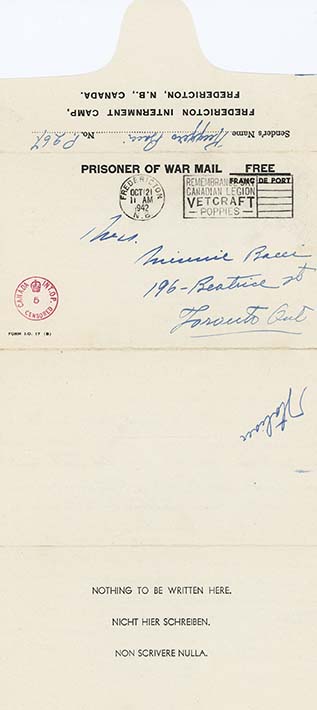Prisoner of War mail, by Ruggero Bacci, to Minnie Bacci, October 20, 1942 - en anglais seulement
This handwritten prisoner of war mail in Italian, was sent by Ruggero Bacci, and is addressed to his wife Minnie Bacci, on October 20, 1942.
Most of the letter addresses the health of his wife and their efforts to end his internment. He notes that the gentlemen who "live at Beverly & Dundas" now determine his future. This is a reference to the Casa d'Italia which was confiscated by the government and used by the Royal Canadian Mounted Police during the war. Apparently these same authorities had told him of his wife's hospitalization and her improved health and release home earlier that month. Bacci was interned for almost three years. In his absence, his wife Erminia (Minnie) suffered a serious nervous breakdown and was hospitalized at length. Nevertheless, Bacci urges her to continue to work to convince the authorities of his innocence and ensure his freedom.
There is also an oblique reference to a letter he received from someone named "Gelina", in which it was noted that "il compare" (the godfather) was inquiring about money held by a group of Torontonians. Bacci claims not to know who "il compare" is. This section is also encircled in pencil, possibly suggesting that it drew the attention of the censors. All camp letters were read by a censor. Contents deemed inappropriate were blacked out with ink. The same applied to incoming mail. Camp letters that were written in Italian were first translated into English before being read by a censor.
Bacci also references his sons in this letter. He notes that should he continue to be unjustly interned, his wife should remember that his sons will be Italian. He had originally used the present-tense "my sons are Italian", but crossed out "sono" and replaced it with the future tense "saranno". Both children were born in Canada.
Bacci's oldest son Aldo was forced to quit high school to help support the family. When his father was released and returned home, Aldo received notice that he was conscripted into the Canadian Army; however, he did not serve overseas.
This document forms part of a collection of documents and other materials on loan by the Bacci family.














































